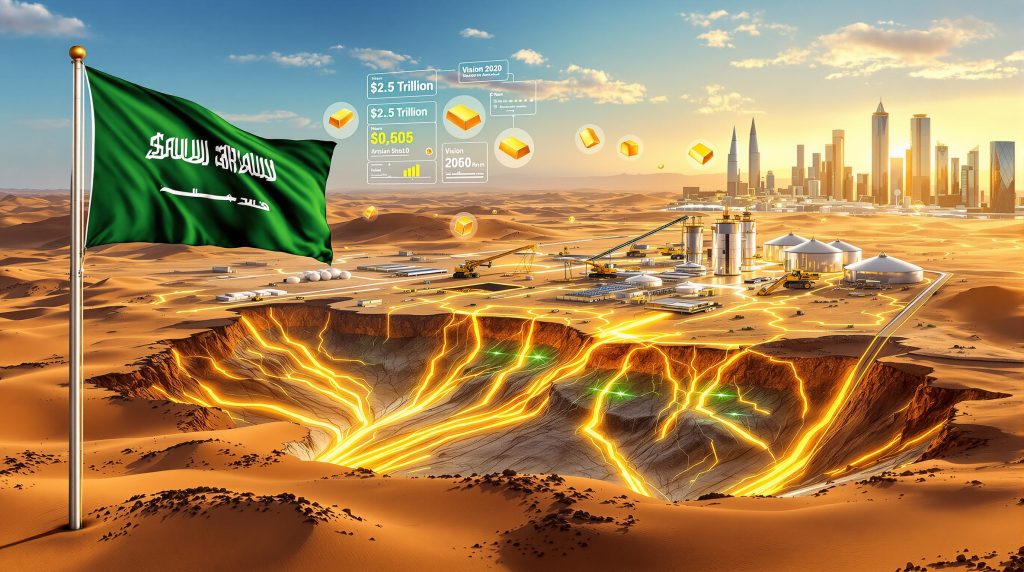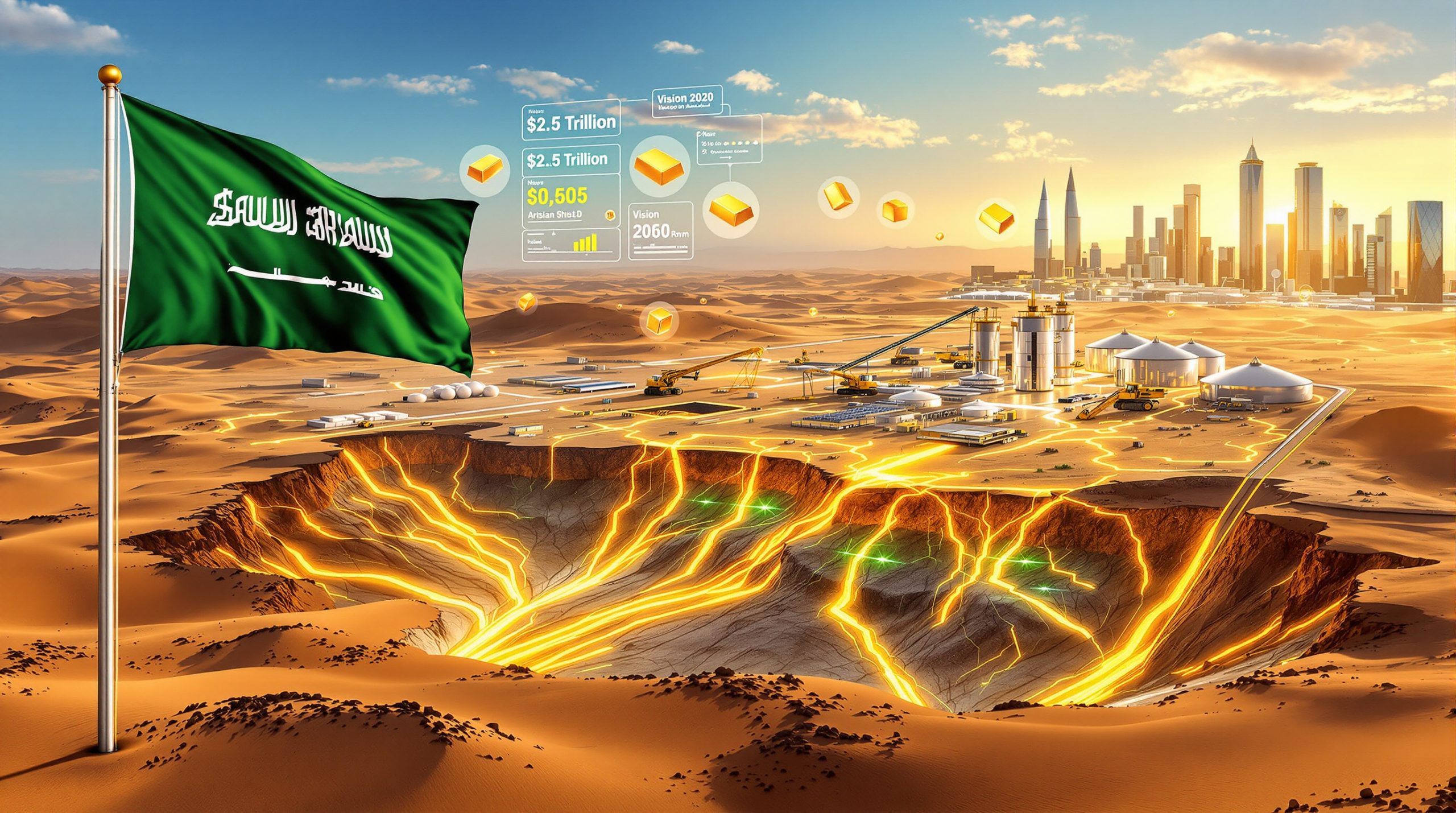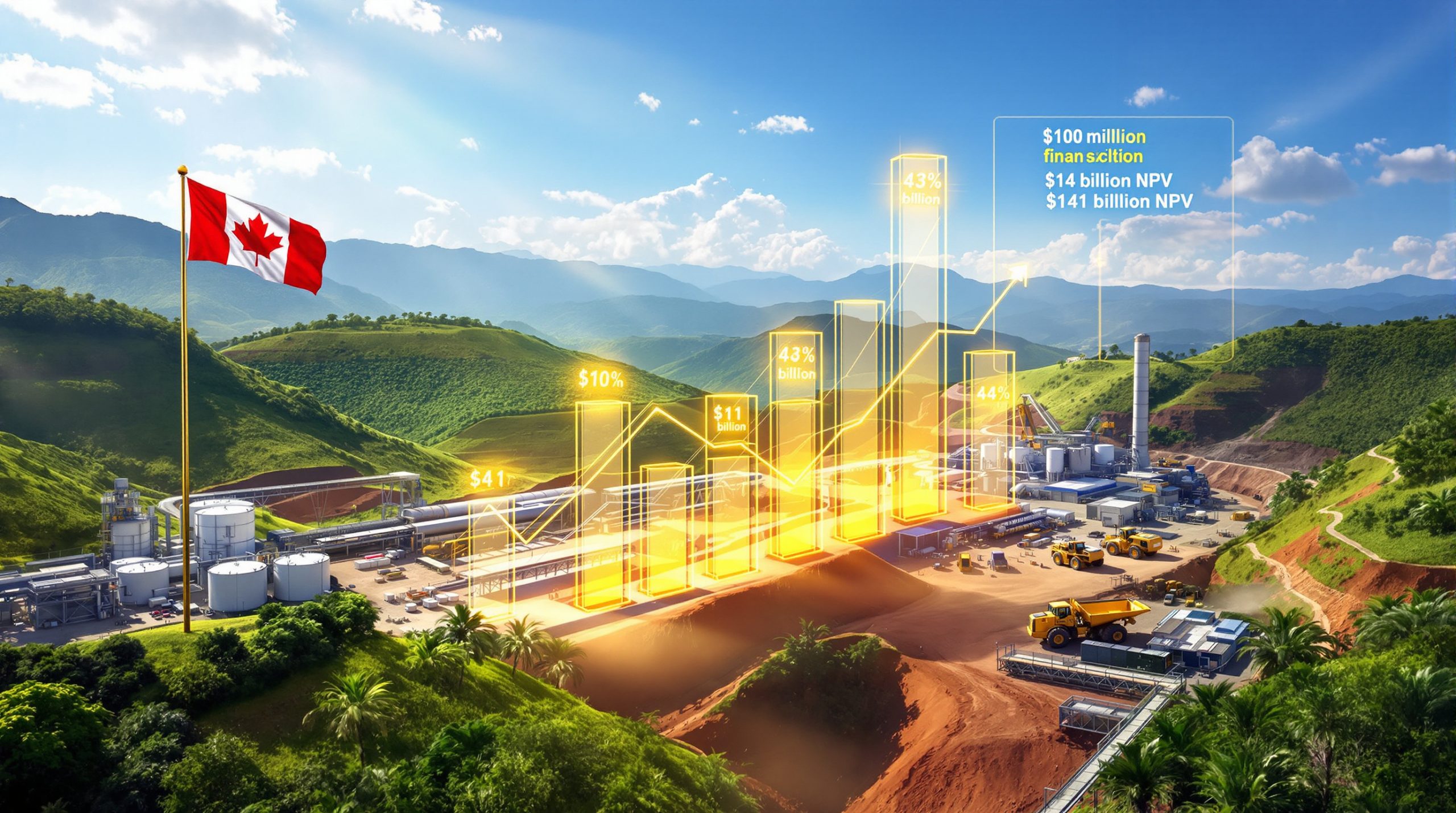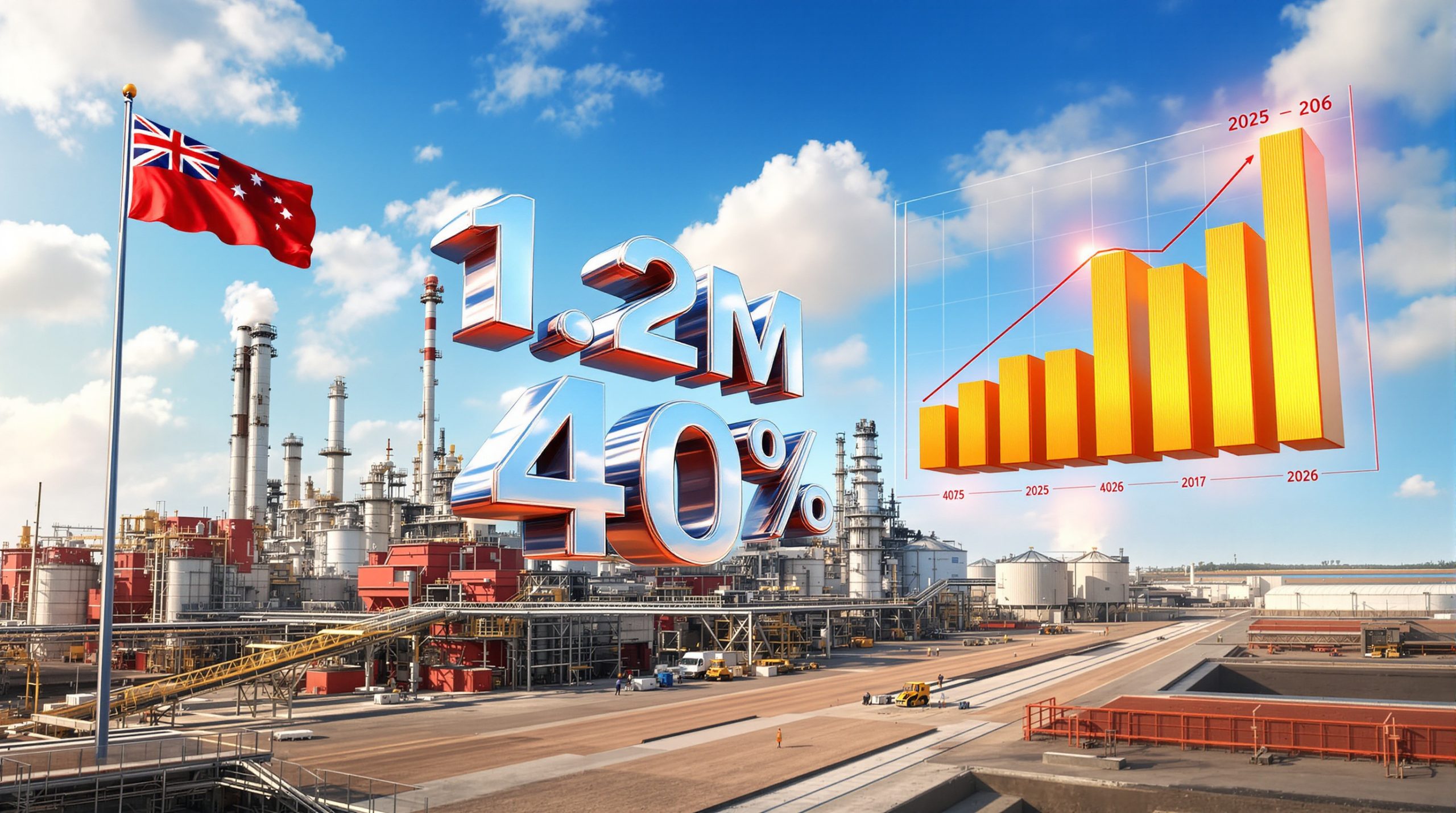Transforming Saudi Arabia's Economic Foundation Through Strategic Mineral Development
Saudi Arabia's ambitious transformation from an oil-dependent economy into a diversified mineral powerhouse represents one of the most significant economic pivots in the modern Middle East. Under the comprehensive Vision 2030 framework, the Kingdom has systematically elevated mining from a peripheral sector to what government officials now characterise as the third pillar of economic growth, positioning alongside oil and gas operations.
This strategic realignment aims to unlock tremendous untapped mineral wealth while establishing Saudi Arabia as an indispensable participant in global supply chains for energy transition materials. The scope of this transformation extends far beyond domestic resource extraction, encompassing international mining investments, advanced processing capabilities, and sophisticated geopolitical positioning through mineral diplomacy.
Unlocking the Kingdom's Vast Geological Treasure Trove
Recent comprehensive geological assessments have revealed extraordinary mineral potential across the Arabian Shield, a massive 600,000 square kilometre Precambrian rock formation that underlies much of western Saudi Arabia. The Kingdom's geological surveys, supported by substantial state investment totalling $530 million in exploration contracts, have resulted in a dramatic upgrade of estimated mineral wealth from $1.2 trillion to an unprecedented $2.5 trillion as of January 2024.
This massive resource base encompasses critical materials essential for the global energy transition and modern manufacturing. The mineral portfolio includes substantial gold deposits with current production reaching 495,000 ounces in 2024 and newly identified reserves exceeding 10 million ounces. Furthermore, extensive phosphate reserves concentrated in the Northern Borders Region, significant bauxite formations supporting integrated aluminium production, and emerging copper and lithium prospects align with future technology demands.
The gold price analysis demonstrates the significant revenue potential from the Kingdom's precious metal resources, whilst the broader critical minerals strategy reflects global trends in resource diversification.
Strategic Mineral Distribution and Production Centres
| Mineral Type | Current Status | Strategic Significance |
|---|---|---|
| Gold | 495,000 oz production (2024) | Major revenue generator with decade-long expansion potential |
| Phosphate | Wa'ad Al-Shamal hub operational | Foundation for fertiliser and chemical industries |
| Bauxite/Aluminium | Ras Al-Khair complex active | Integrated downstream processing capabilities |
| Copper | Jabal Sayid mine producing | Critical for energy infrastructure development |
| Lithium | Exploration phase | Emerging battery technology applications |
The Northern Borders Region contains approximately half of the Kingdom's identified high-grade mineral concentrations, with Wa'ad Al-Shamal City functioning as a major integrated phosphate production and processing hub. This geographic concentration enables efficient infrastructure development and coordinated extraction strategies across multiple mineral types.
Comprehensive Regulatory Framework Modernisation
Saudi Arabia has implemented sweeping institutional reforms designed to create an internationally competitive mining investment environment. The establishment of the Ministry of Industry and Mineral Resources in 2019 centralised mining sector oversight under unified leadership, while the new Mining Investment Law provides transparent, standardised regulatory guidelines for international investors seeking to operate within the Kingdom.
These regulatory improvements have generated measurable results in attracting private sector engagement. The Kingdom introduced competitive licensing procedures for large mineralised belt areas, resulting in a remarkable 350% growth in exploration licences awarded to qualified operators. As of August 2025, active mining licences reached 2,485 permits, demonstrating the rapid expansion of sector activity under the reformed regulatory structure.
Institutional Infrastructure Supporting Mining Growth
The government created specialised entities to comprehensively support mining sector expansion:
- Saudi Geological Survey: Responsible for systematic geological mapping and resource assessment across the Arabian Shield
- National Geological Database: Centralised information management system providing standardised geological data to licensed operators
- Manara Minerals: Sovereign mining investment arm tasked with international asset acquisition and strategic partnerships
- Nuthree Exploration Incubator: Innovation support platform facilitating technology integration and startup development within mining operations
These institutions work in coordination to reduce regulatory uncertainty, provide technical support to operators, and ensure environmental compliance throughout the mining value chain.
Ma'aden's Central Role in National Mining Strategy
Ma'aden, the national mining champion with 65% ownership by the Public Investment Fund, serves as the operational cornerstone of Saudi Arabia's domestic resource industrialisation strategy. The company has evolved from a primarily domestic operator into an integrated mining-to-manufacturing enterprise with global market aspirations and significant production capabilities across multiple mineral categories.
Recent operational achievements demonstrate Ma'aden's expanding production capacity and technological sophistication. The company has successfully ramped up gold production through major projects including the Mansourah-Massarah operation and Ar Rjum project, each capable of sustaining approximately 300,000 ounces of annual production over the next decade.
For instance, the company's strategic partnerships extend beyond precious metals into critical industrial minerals. Ma'aden executed a comprehensive memorandum of understanding with US-based MP Materials for integrated critical minerals value chain development, signaling the company's intent to participate in downstream processing and value addition rather than limiting operations to primary extraction activities.
Advanced Aluminium Operations and International Partnerships
Ma'aden's aluminium operations at the Ras Al-Khair industrial complex represent the Kingdom's most sophisticated downstream mineral processing capability. The integrated facility encompasses bauxite extraction, alumina conversion, and aluminium smelting operations through structured partnerships with international technology leaders.
Alcoa maintains strategic 25.1% equity stakes across three joint ventures within the aluminium value chain: the bauxite mining operation, alumina refining facility, and primary aluminium smelter. This partnership structure demonstrates the Saudi Arabia mining strategy approach to technology transfer and operational expertise acquisition while maintaining majority control over strategic mineral assets.
Attracting Global Mining Investment Through Strategic Incentives
The Kingdom's regulatory reforms and fiscal incentives have successfully positioned Saudi Arabia as an attractive mining investment jurisdiction within the Middle East region. Exploration investment has experienced remarkable growth, surging fivefold from SAR 205 million ($55 million) in 2020 to approximately SAR 1.05 billion ($280 million) in 2024, reflecting growing investor confidence in the Kingdom's long-term commitment to mining sector development.
Major international partnerships demonstrate the practical success of this investment attraction strategy. For example, Barrick Gold, one of the world's largest gold mining companies, established a 50-50 joint venture structure for the Jabal Sayid underground copper mine, providing operational expertise while sharing development costs and production revenues with Saudi partners.
The success of these initiatives mirrors patterns seen in Saudi exploration licenses being awarded to international operators seeking exposure to the Kingdom's mineral potential.
Notable International Mining Partnerships
Eurasian Resources Group Investment: The Africa-focused mining conglomerate committed $50 million toward large-scale, technology-enabled exploration programmes specifically targeting battery transition minerals including lithium, cobalt, and rare earth elements.
Vedanta Strategic Initiatives: India's diversified mining giant announced comprehensive copper processing initiatives alongside plans for a phased zinc-lithium-copper complex development, leveraging India's metallurgical expertise and Saudi Arabia's mineral resources.
Ajlan & Bros-Moxico Resources Partnership: This ambitious joint venture targets $14 billion in combined mining and processing facility investments by 2030, focusing on integrated value chain development from extraction through finished product manufacturing.
Royal Road Minerals Collaboration: The Canadian exploration company established a strategic partnership with Saudi MSB for systematic copper, gold, and base metals exploration across geologically promising formations throughout the Kingdom.
These partnerships demonstrate Saudi Arabia's ability to attract tier-one international mining operators while maintaining strategic control over domestic mineral resources and processing capabilities.
Deploying Cutting-Edge Mining Technologies
The Kingdom has successfully attracted advanced exploration and extraction technologies from global mining industry leaders, positioning Saudi operations at the forefront of mining innovation and efficiency. International technology providers have introduced sophisticated systems specifically adapted to Saudi geological conditions and operational requirements.
Eurasian Resources Group and SK Godelius deployed the remotely-operated soil sampling robot NOMAD, which enables automated mineral detection and sampling across large geographic areas with minimal human intervention. This technology significantly reduces exploration costs while improving sampling accuracy and geological data quality.
However, Ivanhoe Electric introduced proprietary Typhoon electrical geophysical surveying technology to Saudi exploration programmes, providing advanced subsurface mineral detection capabilities that can identify mineralisation at significant depths. These technological investments align with mining technology innovations being deployed globally for sustainable resource extraction practices.
Sustainable Mining Technology Integration
The Kingdom's technological advancement strategy incorporates comprehensive sustainability goals aligned with Vision 2030 environmental objectives. Saudi Arabia targets renewable energy sources to comprise 50% of the overall national energy mix by 2030, directly supporting mining operations through clean electricity generation and reduced operational carbon emissions.
This renewable energy integration supports the Kingdom's stated goal of achieving net-zero carbon emissions while maintaining competitive mining operations. The combination of advanced extraction technology and clean energy systems positions Saudi mining operations as environmentally responsible compared to traditional mining jurisdictions with higher carbon intensity.
Building Comprehensive Downstream Processing Capabilities
Beyond primary mineral extraction, the Kingdom pursues extensive downstream mineral processing infrastructure to maximise value creation and establish integrated supply chains within Saudi borders. Government officials have established ambitious targets for $100 billion in downstream processing investments by 2035, with $32 billion already committed to development or construction phases across multiple mineral categories.
Key downstream processing initiatives demonstrate the scope of Saudi integration ambitions. Plans include a comprehensive battery chemicals complex in Yanbu developed in partnership with EV Metals Group, designed to produce lithium-ion battery components for both domestic electric vehicle manufacturing and international export markets.
The approach reflects successful mineral beneficiation insights from other resource-rich nations that have transformed raw material exports into value-added manufacturing sectors.
Major Industrial Processing Projects
- Steel Manufacturing Complex: A planned $6 billion steel plate mill facility specifically designed to support shipbuilding and defence applications, reducing Saudi dependence on imported steel products
- Integrated Copper Processing: Comprehensive copper processing facilities developed through international partnerships, encompassing ore concentration, smelting, and finished copper product manufacturing
- Electric Vehicle Production: The Kingdom aims to manufacture and export more than 150,000 electric vehicles annually by 2026, demonstrating integration between mining, processing, and advanced manufacturing sectors
This downstream focus transforms Saudi Arabia from a raw material exporter into a comprehensive manufacturing economy capable of producing finished goods for both domestic consumption and international markets.
Manara Minerals' Global Investment Strategy
Manara Minerals, established in 2023 as a joint venture between the Public Investment Fund and Ma'aden, serves as Saudi Arabia's dedicated international mining investment platform. The company operates with a clear mandate to acquire strategic stakes in copper, nickel, lithium, and rare-earth assets globally, securing long-term supply chains for the Kingdom's expanding industrial base.
Manara's investment approach focuses on minority equity positions in high-quality mining assets rather than seeking operational control. This strategy provides financial exposure to global mineral production growth while avoiding the complex operational risks associated with mining in challenging jurisdictions.
Consequently, the company's most significant investment involves a $2.5 billion acquisition of a 10% stake in Vale Base Metals, the energy transition division of Brazilian mining giant Vale. This partnership provides Saudi Arabia with exposure to Vale's ambitious $25-30 billion expansion plans for copper and nickel projects across Brazil, Canada, and Indonesia over the next decade.
International Mining Portfolio Expansion
| Investment Target | Stake Size | Strategic Value |
|---|---|---|
| Vale Base Metals | 10% ($2.5B) | Exposure to tripled copper output and doubled nickel production |
| First Quantum (Zambia) | Minority stake | Access to African copper and nickel assets |
| Reko Diq (Pakistan) | 10-20% ($500M-$1B) | Participation in $9B copper-gold mega-project |
| DRC Projects | Under negotiation | $3B joint venture in African mining operations |
Vale Base Metals Partnership Benefits: The strategic investment provides Saudi Arabia with financial exposure to Vale's planned tripling of copper output and near-doubling of nickel production capacity. This partnership offers long-term supply security while generating investment returns from global copper and nickel market growth.
African Expansion Strategy: Manara maintains advanced negotiations for minority stakes in First Quantum's Zambian copper and nickel assets, while exploring comprehensive joint venture opportunities in the Democratic Republic of Congo valued at approximately $3 billion.
Pakistan Strategic Investment: The expected acquisition of 10-20% of Pakistan's Reko Diq copper-gold project, valued between $500 million and $1 billion, represents both mineral resource access and geopolitical relationship strengthening between Saudi Arabia and Pakistan.
Mining as a Tool for Geopolitical Influence
The Kingdom's comprehensive Saudi Arabia mining strategy serves broader geopolitical objectives beyond economic diversification alone. By securing strategic stakes in global mineral production and developing sophisticated downstream processing capabilities, Saudi Arabia aims to establish itself as a critical swing investor in the global energy transition.
This approach offers significant advantages to key international partners. For Washington, Saudi partnership in copper, nickel, and rare earth minerals provides an alternative to Chinese supply chain dominance, supporting American and allied mining projects through guaranteed offtake agreements and capital investment.
Additionally, mining partnerships reinforce bilateral diplomatic relationships across multiple regions. Manara's planned entry into Pakistan's Reko Diq project strengthens growing geopolitical and military cooperation between Riyadh and Islamabad, while African mining investments position Saudi Arabia as an alternative development partner to Chinese state-owned enterprises.
Strategic Partnership Benefits for Global Partners
The Vision 2030 mining strategy explicitly outlines these international cooperation objectives, while industry analysis shows how Saudi Arabia's mining ambitions create mutual benefits for global partners.
"For the United States: Saudi mining partnerships provide diversified supply chains for critical defence and technology applications, reducing dependence on potentially unreliable sources while supporting American mining project financing."
"For European Partners: Gulf-based mineral trading hubs offer supply security and price stability compared to volatile traditional sources, supporting European industrial competitiveness and energy transition goals."
"For Developing Nations: Saudi investment provides alternative development financing compared to Chinese Belt and Road initiatives, often with more flexible terms and reduced political conditionality."
Economic Impact Targets and GDP Diversification Goals
The Kingdom has established ambitious quantitative targets for mining sector contribution to national economic output and employment generation. Officials project elevating mining's GDP contribution from less than 3% in 2020 to approximately 6% by 2030, translating to around $75 billion in annual economic output from mining and related processing activities.
Government projections indicate the mining sector's GDP contribution reaching SAR 281 billion by 2030, supported by nearly $200 billion in total sector investments across domestic extraction, processing facilities, and international mining asset acquisitions. Cumulative investments have already exceeded $45 billion, demonstrating substantial progress toward these ambitious economic diversification targets.
Employment and Industrial Development Goals
The mining sector expansion is expected to generate significant direct and indirect employment opportunities while supporting the development of high-value manufacturing sectors including electric vehicle production, battery manufacturing, and advanced materials processing.
These employment goals align with Vision 2030's broader objectives of reducing youth unemployment and creating private sector career opportunities for Saudi nationals across technical and professional roles within the mining value chain.
Implementation Challenges and Strategic Constraints
Despite impressive progress across multiple dimensions, the Kingdom confronts several significant implementation challenges that could affect the timeline and success of mining sector transformation. Mining projects typically require decade-long development timelines from initial agreements to commercial production, testing the patience of a political system that has become accustomed to immediate, visible infrastructure mega-projects.
International mining operations expose Saudi Arabia to complex jurisdictional risks including permitting delays, community relations challenges, and environmental compliance scrutiny in countries like Congo and Pakistan. The Kingdom must navigate these operational complexities while competing against established players like China's Zijin Mining across Africa and Latin America.
Capital Allocation and Domestic vs. International Balance
The Public Investment Fund faces increasing pressure to reduce foreign investment allocation by approximately 20% to focus capital on domestic Vision 2030 projects, even as Manara Minerals scales up overseas mining investments. This tension requires careful capital allocation balancing between immediate domestic development needs and long-term international mineral supply security.
Project Timeline Management: Mining development from memorandum of understanding signing to first production typically spans 8-10 years, requiring sustained political commitment and patient capital deployment across multiple government administrations.
Operational Risk Management: International mining operations require expertise in community relations, environmental compliance, and local regulatory navigation that differs significantly from domestic Saudi operational experience.
Competitive Positioning: Saudi Arabia must compete against established mining powers including Chinese state-owned enterprises, Australian mining giants, and Canadian exploration companies with decades of international operational experience.
Future Minerals Forum as Global Mining Diplomacy Platform
The annual Future Minerals Forum serves as Saudi Arabia's premier diplomatic platform for advancing its comprehensive mining strategy and positioning the Kingdom as a global leader in mineral supply chain discussions. The event, characterised by officials as the UN of Minerals, has attracted over 18,000 attendees and facilitated 126 agreements worth approximately $28.5 billion across exploration, financing, research, and processing initiatives during 2025.
The 2026 forum, themed Dawn of a Global Cause, expects even greater international participation as global attention on mineral security and supply chain resilience intensifies. These annual gatherings provide Saudi Arabia with opportunities to showcase regulatory improvements, highlight investment opportunities, and build strategic partnerships with mining companies and mineral-consuming nations.
Diplomatic and Commercial Outcomes
The Future Minerals Forum has generated concrete commercial and diplomatic results beyond symbolic importance. Recent forums have produced binding agreements for exploration partnerships, financing commitments, technology transfer arrangements, and long-term supply contracts that translate into measurable economic activity.
The forum also serves as a venue for Saudi officials to engage with international policymakers, mining executives, and technology providers in comprehensive discussions about mineral supply security, environmental standards, and geopolitical cooperation in resource development.
Long-Term Vision for Saudi Mining Leadership Beyond 2030
Saudi Arabia's comprehensive mining transformation represents a fundamental strategic pivot from oil-dependent economics toward diversified resource leadership that extends well beyond the initial Vision 2030 timeframe. The Kingdom's strategy explicitly acknowledges that future global influence will depend increasingly on controlling critical mineral supply chains rather than solely relying on hydrocarbon export revenues.
Success in this ambitious transformation could position Saudi Arabia as an indispensable partner for nations and industries seeking secure, reliable access to energy transition metals including copper, lithium, nickel, and rare earth elements. The Kingdom's unique combination of vast domestic mineral resources, substantial investment capital through the Public Investment Fund, and strategic geographic position provides significant competitive advantages in the evolving global minerals landscape.
Critical Success Factors for Long-Term Achievement
Realising these ambitious goals requires sustained execution across several critical dimensions:
- Complex International Project Management: Successfully developing mining projects in challenging jurisdictions while maintaining operational efficiency and environmental compliance
- Geopolitical Relationship Management: Effectively balancing relationships with major powers including the United States, China, and European partners while advancing Saudi strategic interests
- Continued Technological Innovation: Maintaining leadership in sustainable extraction practices, processing efficiency, and environmental stewardship throughout the mining value chain
- Human Capital Development: Building sophisticated mining engineering, geological, and operational expertise within the Saudi workforce to support long-term sector growth
The next decade will be decisive in determining whether Saudi Arabia successfully transitions from its historical role as an oil giant to emerge as a comprehensive mining superpower capable of fundamentally reshaping global mineral supply chains and its own economic foundation.
Disclaimer: The analysis presented reflects current industry trends and government policies as of late 2025. Mining sector investments involve significant risks including commodity price volatility, regulatory changes, and operational challenges. Investment decisions should be based on comprehensive due diligence and professional financial advice. Projected timelines and economic targets represent aspirational goals that may be affected by market conditions, technical challenges, and geopolitical developments.
Looking to Capitalise on Global Mining Transformations?
Whilst Saudi Arabia's ambitious mining strategy unfolds over decades, immediate opportunities exist right now on the Australian Stock Exchange. Discovery Alert's proprietary Discovery IQ model delivers real-time alerts on significant ASX mineral discoveries, empowering subscribers to identify actionable opportunities ahead of the broader market. Begin your 30-day free trial today and secure your market-leading advantage in the rapidly evolving minerals sector.




